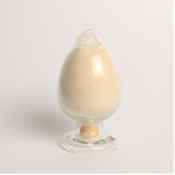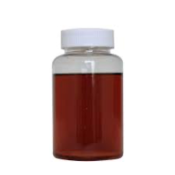Mid-temperature ⍺ – Amylase
- Home
- Products & Applications
- Mid-temperature ⍺ – Amylase


Mid-temperature ⍺ - Amylase
Description:
Mid-Temperature α-Amylase is the result of the deep fermentation of Bacillus subtilis. This enzyme is commonly used in the manufacturing of sugar from starch and alcohol production, including beer. Industries such as textiles, dyeing, printing, papermills and feed also use it.
Technical information:
- Available in liquid (light brown) at 2,000; 3,000 & 5,000 u/ml. it is also available in powder form (yellow) at 2,000; 3,000; 4,000 and 5,000 u/g. Food grade (white color) can be custom made at concentrations of 1,000 to 10,000 u/g.
- Temperature range: 30 to 90℃ (Optimum temperature: 60-70℃).
- pH range: 4.5-8.0 (Optimum pH: 5.2-6.2)
- Unit definition: The amount of enzyme required to hydrolyze 1 mg of starch in 1 hour at pH 6.0 at 60ºC
- Standard GB/T 24401-2009
Mode of Action:
Mid-Temperature α-Amylase randomly hydrolyzes α-1-4 glucosidic linkages of gelatinized starch transforming them into dextrin molecules reducing the viscosity of the starch slurry.
Uses:
- Beer and alcohol
Mid- Temp-α-Amylase is a major mash enzyme in the production of fermentable wort by digesting starch into smaller units. Better results can be obtained by adding β-amylase. Higher levels of Mid-Temp-α-Amylase help produce a thick, rich beer.
Recommended dosage: 6.0 L/ton of raw material based on 2,000 u/ml. Keep at 80-90℃ for 30 minutes. - Fermentation industry
In the production of starch sugar, monosodium glutamate and industries that use liquefaction fermentation industry. Starch slurry is 16-18Be’; adjust pH to 6.2-6.4; add 0.2% calcium chloride (calculate on weight of raw material) add α-amylase at a rate of 6.0-8. 0 L/t raw material (based on 2000u/ml) Blend well and heat to 85-90°C for 30 minutes. - Textile industry
Mid-Temp-α-Amylase hydrolyzes starch from the fabric, known as desizing, by breaking it into smaller molecules that can be easily washed away from the fabric or dissolved in hot water.
Recommended dosage: Add Mid-Temperature α-Amylase at a rate of 0. 2% On Weight of Fabric (owf) based on 2000 u/ml. at 50-80 ℃ for 20-40 minutes. - Feed industry
Mid-Temp-α-Amylase in diets for broilers facilitate the digestibility of the starch present in the diet.
Best results are obtained when used in combination with pectinase, ß-glucanase and xylanase.
Recommended dosage: 0.02 to 0.04 kg/ton of raw material - Juice Processing
In juice processing, Mid-Temp-α-Amylase degrades starch into smaller units preventing post bottling haze formation. Since apples contain considerable amounts of starch, particularly at the beginning of the harvest season, Mid-Temp-α-Amylase will improve the yield and clarification of apple juice Mid-Temp-α-Amylase also helps in the elaboration of kiwi juice.
Recommended dosage: 0.02-0. 1 L/t of the original juice slurry based on 2000 u/ml) at 45℃ for 60-120 minutes
Packaging, Storage & Handling
- Liquid: Plastic drums of 22; 200; 840 and 1,000 L.
- Powder: 20 kg cartons; 25 kg bags and 25 kg drums.
- Storage & handling:
- Avoid exposure to direct sunlight; keep in clean, cool, and dry place
